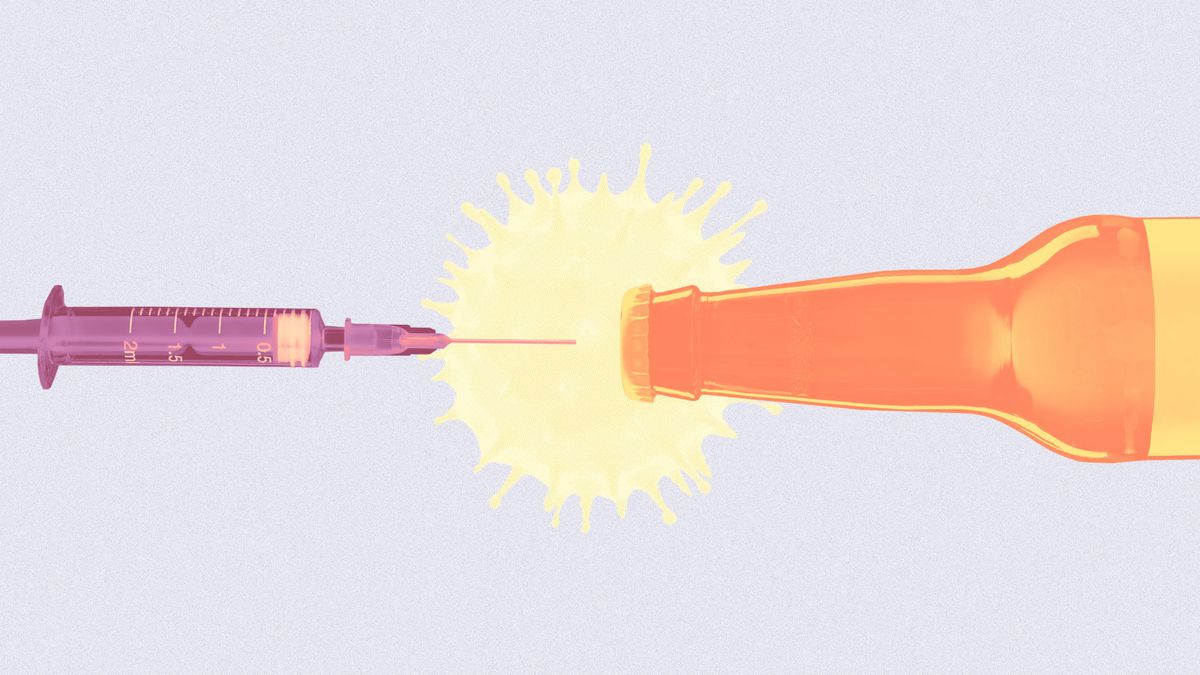Why You Might Want to Skip That Celebratory Drink After Your COVID-19 Vaccine
If you're due to get your COVID-19 shot soon, you might have lots of questions about what you should and shouldn't do before and after the vaccine—such as whether it's safe to celebrate finally receiving your shot with a few drinks. The Centers for Disease Control and Prevention (CDC) has released guidelines for people who've been newly vaccinated, but while they recommend avoiding OTC pain meds (like ibuprofen and Tylenol) before the vaccine—and talking to your doctor about taking the meds to relieve any discomfort after the vaccine)—there's no mention of alcohol.
In the UK, experts recently advised people to avoid drinking alcohol in the days leading up to and after receiving the COVID-19 vaccine. "You need to have your immune system working tip-top to have a good response to the vaccine, so if you're drinking the night before, or shortly afterwards, that's not going to help," Sheena Cruickshank, PhD, an immunologist at the University of Manchester, told UK Metro.
And a Russian health official went a lot further last month, telling people who received the country's Sputnik V vaccine that they should abstain from alcohol for two months. However, the developer of the Sputnik V vaccine, Alexander Gintsburg, PhD, later said this advice is far too extreme. Tweeting from the official Sputnik V account, Gintsburg advised refraining from alcohol for three days after each injection. Gintsburg added that this guidance applies to all vaccines.
In the US, there's no official government recommendation on drinking alcohol before or after any of the three COVID-19 vaccines. But research on the Moderna, Pfizer-BioNTech and Johnson & Johnson vaccines didn't ask trial participants to avoid alcohol, and there's no mention of people having issues after drinking in the trial results. Nor do the Food and Drug Administration (FDA) vaccination guidance for the Pfizer, Moderna and Johnson & Johnson vaccines make any reference to alcohol.
However, while there's no evidence that drinking alcohol affects the efficacy of the COVID-19 vaccine or causes any unwanted health effects, the doctors we spoke to advise against drinking alcohol immediately after receiving the shot.
"Vaccine side effects include muscle aches and pains and feeling under the weather. Compounding that with the side effects of alcohol runs the risk of making you feel worse," Tania Elliott, MD, clinical instructor of medicine at NYU Langone Health, tells Health.
Jagadeesh Reddy, MD, infectious disease specialist with Providence Mission Hospital in Orange County, California, agrees. "Though there is no data on this, it is advisable to abstain or reduce alcohol intake for the first 48-72 hours after vaccination as this is the usual period one might expect common and usually mild after effects of vaccination, like fatigue, muscle aches, injection site pain, etc," Dr. Reddy tells Health.

Another issue is that people who drink alcohol after getting the shot might blame their hangover symptoms on the vaccine, adds infectious disease expert Amesh A. Adalja, M.D., senior scholar at the Johns Hopkins Center for Health Security. If they've signed up for the CDC's V-Safe After Vaccination Health Checker, they might report those hangover symptoms as side effects, and even tell other people about them—which could put people off getting the vaccine, Dr. Adalja tells Health.
Instead of knocking back the booze post-vaccine, give your body time to recover. "Focus on rest and hydration," Dr. Elliott says. You can always celebrate with your favorite cocktail a few days later. Just remember to stick to the CDC's recommended daily guidelines—two drinks for men and one for women. Although casual or moderate alcohol consumption won't impact your response to the COVID-19 vaccine, excessive alcohol consumption is bad for a number of other health reasons.
The information in this story is accurate as of press time. However, as the situation surrounding COVID-19 continues to evolve, it's possible that some data have changed since publication. While Health is trying to keep our stories as up-to-date as possible, we also encourage readers to stay informed on news and recommendations for their own communities by using the CDC, WHO, and their local public health department as resources.
To get our top stories delivered to your inbox, sign up for the Healthy Living newsletter
Source: Read Full Article
